Development of the human infant intestinal microbiota
- PMID: 17594176
- PMCID: PMC1896187
- DOI: 10.1371/journal.pbio.0050177
Development of the human infant intestinal microbiota
Abstract
Almost immediately after a human being is born, so too is a new microbial ecosystem, one that resides in that person's gastrointestinal tract. Although it is a universal and integral part of human biology, the temporal progression of this process, the sources of the microbes that make up the ecosystem, how and why it varies from one infant to another, and how the composition of this ecosystem influences human physiology, development, and disease are still poorly understood. As a step toward systematically investigating these questions, we designed a microarray to detect and quantitate the small subunit ribosomal RNA (SSU rRNA) gene sequences of most currently recognized species and taxonomic groups of bacteria. We used this microarray, along with sequencing of cloned libraries of PCR-amplified SSU rDNA, to profile the microbial communities in an average of 26 stool samples each from 14 healthy, full-term human infants, including a pair of dizygotic twins, beginning with the first stool after birth and continuing at defined intervals throughout the first year of life. To investigate possible origins of the infant microbiota, we also profiled vaginal and milk samples from most of the mothers, and stool samples from all of the mothers, most of the fathers, and two siblings. The composition and temporal patterns of the microbial communities varied widely from baby to baby. Despite considerable temporal variation, the distinct features of each baby's microbial community were recognizable for intervals of weeks to months. The strikingly parallel temporal patterns of the twins suggested that incidental environmental exposures play a major role in determining the distinctive characteristics of the microbial community in each baby. By the end of the first year of life, the idiosyncratic microbial ecosystems in each baby, although still distinct, had converged toward a profile characteristic of the adult gastrointestinal tract.
Conflict of interest statement
Figures
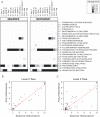

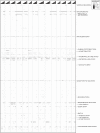
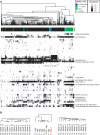

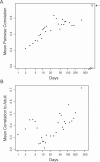
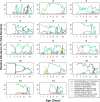
Comment in
-
Microbes colonize a baby's gut with distinction.PLoS Biol. 2007 Jul;5(7):e191. doi: 10.1371/journal.pbio.0050191. Epub 2007 Jun 26. PLoS Biol. 2007. PMID: 20076678 Free PMC article. No abstract available.
References
-
- Ley RE, Turnbaugh PJ, Klein S, Gordon JI. Microbial ecology: Human gut microbes associated with obesity. Nature. 2006;444:1022–1023. - PubMed
Publication types
MeSH terms
Substances
Grants and funding
LinkOut - more resources
Full Text Sources
Other Literature Sources
Medical
Molecular Biology Databases
Research Materials

